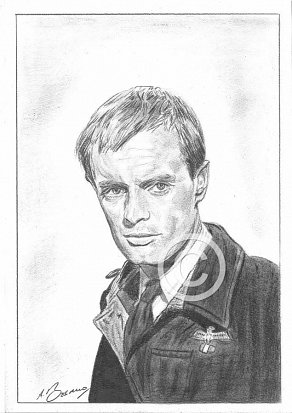David McCallum
Pencil Portrait by Antonio Bosano.

Shopping Basket
The quality of the prints are at a much higher level compared to the image shown on the left.
Order
A3 Pencil Print-Price £45.00-Purchase
A4 Pencil Print-Price £30.00-Purchase
*Limited edition run of 250 prints only*
All Pencil Prints are printed on the finest Bockingford Somerset Velvet 255 gsm paper.
P&P is not included in the above prices.

Recommended viewing
Violent Playground (1958)
See commentary in the Stanley Baker section.
http://www.antoniobosano.com/film/stanley-baker.php
The film was shot on location in Lverpool, mainly around the ‘Gerard Garden’ flats and surrounding streets, which were subsequently demolished in the 80’s. It therefore remains a fascinating reminder of the city for ‘baby boomers.’
http://www.reelstreets.com/index.php/component/films_online/?task=view&id=1087&start=10”
Juke Box Jury (BBC Tv) 1960
The distinctive twang of Vic Flick’s guitar and the sound of the John Barry 7, would herald the regualr early saturday evening broadcast of the BBC’s flagship teen music show ‘Juke Box Jury.’
Due in no small part to the ephemeral nature of pop music, it seems incredible that such a simple format could have remained so popular over an eight year period (1959-67.) Yet these were more innocent times.
The show’s format was very simple: a panel of four guests would listen to a batch of the latest pop singles and judge them a hit or a miss. The fact that the programme was performance-free meant that during a song, the camera would pan around the studio audience, linger on the celebrity panel or cut back to the show’s host, originally the DJ David Jacobs, to no great purpose. Despite this lack of visual interest, the show proved extremely popular, with a weekly audience peaking at around 12 million, while an appearance by the Rolling Stones as the panellists attracted 10,000 requests for tickets for the programme’s recording. The most famous guests to appear on the show were The Beatles, who generated such pandemonium that the audience drowned out much of what they said. The group’s appearance survives in rather diminished form – a mute only 8mm cinescope and lo-fidelity audio tape recorded domestically by a fan. The two elements have been synched by the BBC, but the programme remains unsuitable for repeat broadcasting. A superior quality recording of George Harrison’s solo appearance on the show in July 1964 is believed to survive, although the Harrison estate has not confirmed this rumour.
The affable Jacobs and his catchphrase “Let’s hear what the panel thinks of the next record,” the programme’s John Barry theme, ‘Hit and Miss,’ the large jukebox on which the records were played and which featured in the opening and closing credits, along with the use of simple sound effects – a buzzer for a hit and a hooter for a miss – combined to create a hit show. The occasional practice whereby one of the week’s featured recording artists would appear from behind the scenes could add frisson to proceedings, particularly if their record had been deemed a miss.
A minute fraction of film survives, and by coincidence features a complete episode featuring David McCullum and his first wife, the actress Jill Ireland. The discs reviewed are disposable fodder, our homegrown record industry in seemingly irreversible terminal decline by the advent of the 60’s. Presenter David Jacobs already looks like a throwback to a different era, whilst the 26 year old McCullum at least appears to have his finger on the nation’s musical pulse.
‘Juke Box Jury’ was revived twice; the first time fronted by Noel Edmonds (BBC, 1979) – which featured an extremely obnoxious Johnny Rotten being as boorish as John Lennon was on a June 1963 edition – and the second by Jools Holland (BBC, 1989-90), but neither attempt recaptured the popularity of the original, if only because it initially appeared at a time before dedicated pop music radio, when any opportunity to hear the latest singles was eagerly pounced on by its teenage audience.


Comments
‘The Man from UNCLE’_, NBC’s top rated series from the 60’s, is due for a makeover in the directorial hands of Guy Ritchie.
As the heroic Russian agent Ilya Kuryakin, David McCallum charmed 60’s television audiences all over the world with his stoic charm and groovy blonde mop top. Now in his 81st year, he has little need to brace the icy winds of his seventh decade in movies.
Today, in 2014, Scottish actor David McCallum is more successful than ever, and even more popular than James Bond. The veteran actor is one of the main stars of the phenomenally successful detective series ‘NCIS,’ which is watched by 22 million viewers every week in the USA, but despite its continued success, he was shocked to be recently voted above Judi Dench, Benedict Cumberbatch and Daniel Craig in a list of America’s favourite British actors.
It’s been one hell of a journey…………
By the time I first became aware of him, he was already a veteran of some twenty or more years, having begun his career at the age of ten performing on the radio. A musical career had initially beckoned following lessons on the oboe and French horn, but his real inclination soon became apparent, leading to a position at RADA. After a brief stint in the Army, he spent some time in English repertory theatre, toiling at a range of production duties. An early photoshoot led to the Rank Organisation taking an ‘option’ on him, an initial contract that would provide a string of juvenile roles – delinquent (‘Violent Playground’), leading man’s younger brother (‘Hell Drivers’) and sailor (‘A night to remember’).